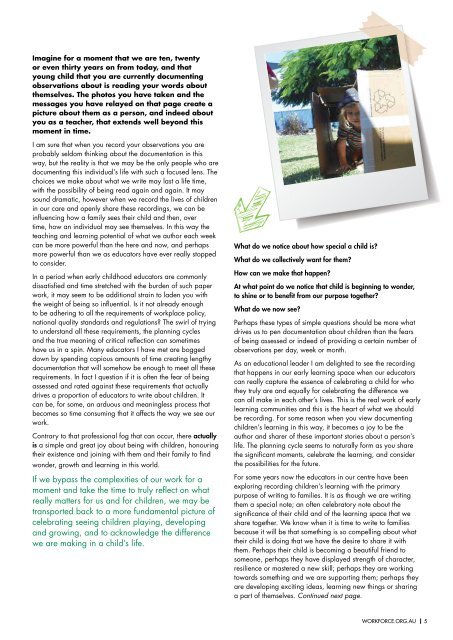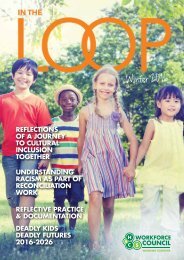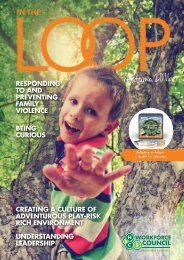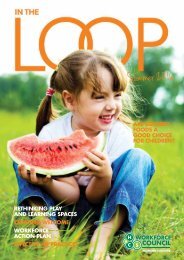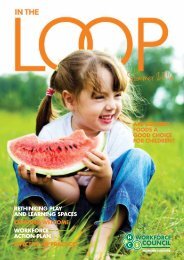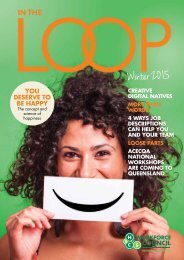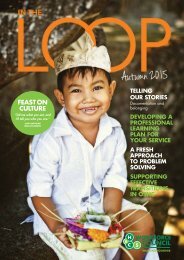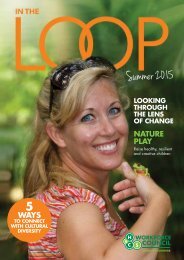The Loop Spring 2015 web.pdf
- No tags were found...
You also want an ePaper? Increase the reach of your titles
YUMPU automatically turns print PDFs into web optimized ePapers that Google loves.
Imagine for a moment that we are ten, twenty<br />
or even thirty years on from today, and that<br />
young child that you are currently documenting<br />
observations about is reading your words about<br />
themselves. <strong>The</strong> photos you have taken and the<br />
messages you have relayed on that page create a<br />
picture about them as a person, and indeed about<br />
you as a teacher, that extends well beyond this<br />
moment in time.<br />
I am sure that when you record your observations you are<br />
probably seldom thinking about the documentation in this<br />
way, but the reality is that we may be the only people who are<br />
documenting this individual’s life with such a focused lens. <strong>The</strong><br />
choices we make about what we write may last a life time,<br />
with the possibility of being read again and again. It may<br />
sound dramatic, however when we record the lives of children<br />
in our care and openly share these recordings, we can be<br />
influencing how a family sees their child and then, over<br />
time, how an individual may see themselves. In this way the<br />
teaching and learning potential of what we author each week<br />
can be more powerful than the here and now, and perhaps<br />
more powerful than we as educators have ever really stopped<br />
to consider.<br />
In a period when early childhood educators are commonly<br />
dissatisfied and time stretched with the burden of such paper<br />
work, it may seem to be additional strain to laden you with<br />
the weight of being so influential. Is it not already enough<br />
to be adhering to all the requirements of workplace policy,<br />
national quality standards and regulations? <strong>The</strong> swirl of trying<br />
to understand all these requirements, the planning cycles<br />
and the true meaning of critical reflection can sometimes<br />
have us in a spin. Many educators I have met are bogged<br />
down by spending copious amounts of time creating lengthy<br />
documentation that will somehow be enough to meet all these<br />
requirements. In fact I question if it is often the fear of being<br />
assessed and rated against these requirements that actually<br />
drives a proportion of educators to write about children. It<br />
can be, for some, an arduous and meaningless process that<br />
becomes so time consuming that it affects the way we see our<br />
work.<br />
Contrary to that professional fog that can occur, there actually<br />
is a simple and great joy about being with children, honouring<br />
their existence and joining with them and their family to find<br />
wonder, growth and learning in this world.<br />
If we bypass the complexities of our work for a<br />
moment and take the time to truly reflect on what<br />
really matters for us and for children, we may be<br />
transported back to a more fundamental picture of<br />
celebrating seeing children playing, developing<br />
and growing, and to acknowledge the difference<br />
we are making in a child’s life.<br />
What do we notice about how special a child is?<br />
What do we collectively want for them?<br />
How can we make that happen?<br />
At what point do we notice that child is beginning to wonder,<br />
to shine or to benefit from our purpose together?<br />
What do we now see?<br />
Perhaps these types of simple questions should be more what<br />
drives us to pen documentation about children than the fears<br />
of being assessed or indeed of providing a certain number of<br />
observations per day, week or month.<br />
As an educational leader I am delighted to see the recording<br />
that happens in our early learning space when our educators<br />
can really capture the essence of celebrating a child for who<br />
they truly are and equally for celebrating the difference we<br />
can all make in each other’s lives. This is the real work of early<br />
learning communities and this is the heart of what we should<br />
be recording. For some reason when you view documenting<br />
children’s learning in this way, it becomes a joy to be the<br />
author and sharer of these important stories about a person’s<br />
life. <strong>The</strong> planning cycle seems to naturally form as you share<br />
the significant moments, celebrate the learning, and consider<br />
the possibilities for the future.<br />
For some years now the educators in our centre have been<br />
exploring recording children’s learning with the primary<br />
purpose of writing to families. It is as though we are writing<br />
them a special note; an often celebratory note about the<br />
significance of their child and of the learning space that we<br />
share together. We know when it is time to write to families<br />
because it will be that something is so compelling about what<br />
their child is doing that we have the desire to share it with<br />
them. Perhaps their child is becoming a beautiful friend to<br />
someone, perhaps they have displayed strength of character,<br />
resilience or mastered a new skill; perhaps they are working<br />
towards something and we are supporting them; perhaps they<br />
are developing exciting ideas, learning new things or sharing<br />
a part of themselves. Continued next page.<br />
WORKFORCE.ORG.AU 5


